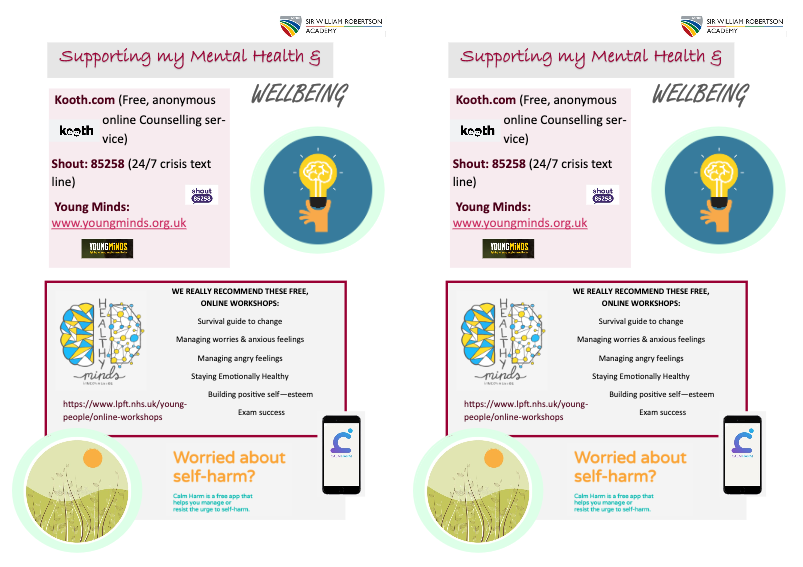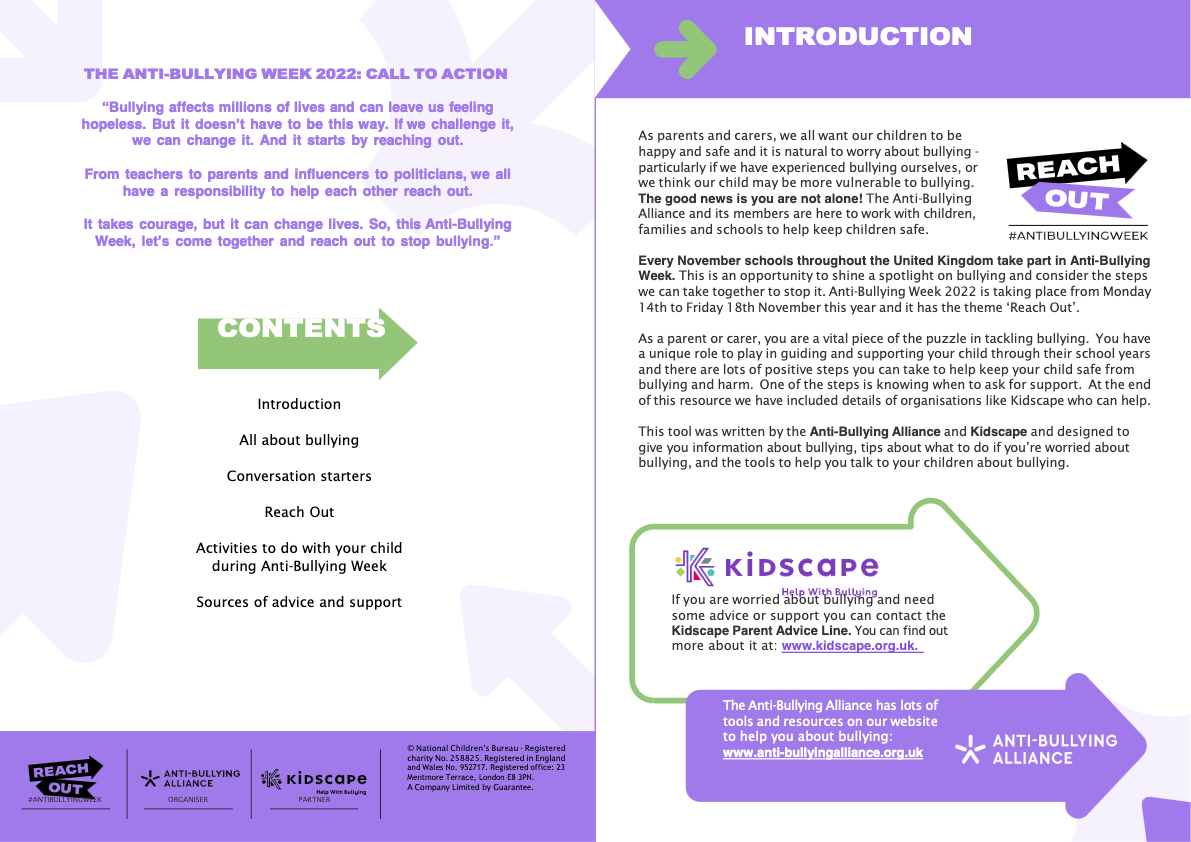Student Health & Wellbeing
Mental Health Resources
General information relevant to children and young people’s wellbeing and mental health:
-
Calm Harm is designed to help people resist or manage the urge to self-harm.
-
Catch it helps people manage feelings like anxiety and depression and improve mental wellbeing.
-
The Student health app is designed to reduce your worries, feel more confident and get the support you need at what can be a challenging time for any student.
-
Thrive helps you prevent and manage stress, anxiety and related conditions.
-
Students Against Depression is a website offering advice, information, guidance and resources to those affected by low mood, depression and suicidal thinking.
-
Place2Be has a host of mental health resources available. They organise Children’s Mental Health Week every year.
-
SafeSpot is an iPhone and Android app that promotes positive mental wellbeing in children and young people and has been designed to help children and young people with their coping skills.
-
Young Minds: a letter about how I’m feeling: worksheet to help pupils express their feelings and understand what may have triggered them. For use with pupils in school or at home.
-
Cruse Bereavement Care: Coronavirus, Bereavement and Grief online information, advice and support. Helpline: 0808 808 1677.
-
Here4U: Self-referral :: Lincolnshire Young Minds (lpft.nhs.uk) allows referral to Young People Services in Lincolnshire.
Sometimes, children need specific and targeted resources to help with problems they are facing. Below we have outlined some support available for particular issues, including loneliness, suicide prevention, eating disorders and domestic abuse.
SEND
- The SEND Gateway is a good source of information for professionals, containing resources on responding appropriately to children and young people with SEND with emotional wellbeing needs.
Care leavers
- DfE have published factsheets for care leavers, setting out the support they can access during Covid-19, including one on their wellbeing and where to access support for their mental health.
Loneliness
- Resources from University of Bath and the ‘Tell Me about Loneliness’ project provide advice and tips about how to tackle loneliness and are thoroughly rooted in evidence of young people’s experiences during loneliness.
- The Let’s Talk Loneliness campaign – the website provides a whole host of resources and information for those feeling lonely, including blogs and podcasts from those who have experienced loneliness.
Bullying, harassment, and abuse
- The government tool Respectful school communities: a tool to support school staff to combat bullying, harassment and abuse of any kind.
Bereavement support
- Childhood Bereavement Network has a range of resources to help schools to respond to a bereavement and to provide support to bereaved pupils and their families. It also includes signposting to local bereavement services.
- Cruse Bereavement Care: Coronavirus, Bereavement and Grief online information, advice and support. Helpline: 0808 808 1677
Self-harm
- University of Oxford guide for parents and carers on supporting their child or young person in dealing with self-harm.
Eating disorders
- BEAT advice and support on eating problems and disorders, with general downloads and resources and advice for school and college teachers and staff:
- Helpline: 0808 801 0677
- Youthline: 0808 801 0711
- Studentline: 0808 801 0811
The Sanctuary chat room for people with an eating disorder, created specifically in response to coronavirus.
Suicide prevention
- Papyrus (Prevention of Young Suicide) provides confidential advice and support for young people who feel suicidal and has published a guide for teachers and staff
- HOPEline UK: 0800 068 41 41
- Text: 07786 209 697
- Email:[email protected]
- The Zero Suicide Alliance collaboration of National Health Service trusts, charities, businesses and individuals offers free suicide prevention training.
- Samaritans is a national organisation for anyone in distress and in need of immediate support:
- Tel: 0116 123
- Email: [email protected]
Trauma
- UK Trauma Council resources on coronavirus and trauma
Domestic abuse
- Operation Encompass Teachers’ Helpline staffed by educational psychologists, to support staff working with children and young people at risk of or experiencing domestic abuse (0204 513 9990, weekdays during term-time, 8-11am).
Drug and alcohol support
- Find confidential local drug and alcohol support services here or phone 03001236600 for confidential support from Talk to Frank.
Anti-Bullying
- Please read our Anti-Bullying policy
- Find help and support (anti-bullyingalliance.org.uk)
- 2021_ABA_TopTips_ChildrenAndYoungPeople.pdf (anti-bullyingalliance.org.uk)
Helplines
- Children and young people can access free confidential support anytime from Government-backed voluntary and community sector organisations by:
- texting SHOUT to 85258
- calling Childline on 0800 1111
- calling the Mix on 0808 808 4994 or texting THEMIX to 85258
Parent Packs
Support

Anti-bullying
